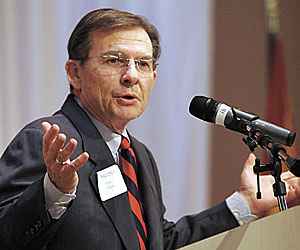 |
|
MATT ROBLES/Arizona Daily Wildcat
|
President Likins delivers his state of the university address yesterday afternoon in the Grand Ballroom of the Student Union Memorial Center.
|
|
|
By Natasha Bhuyan
Arizona Daily Wildcat
Tuesday, November 23, 2004
Print this
President looks to better days in State of University address
Although university employees may be feeling "pain" now due to budget cuts and program eliminations, the UA has a promising future because of bold visions and higher standards of excellence, said UA President Peter Likins yesterday.
In his State of the University address, Likins spoke about the UA's national future to a crowd of more than 500, including U.S. Congressman Jim Kolbe (R-Ariz.), former U.S. Congressman Jim McNulty, Tucson Mayor Bob Walkup, and three past UA presidents: John Schaefer, Henry Koffler, and Manuel T. Pacheco.
During his speech, Likins discussed the progress of Focused Excellence, a plan that reallocates funds to strengthen specific programs, which was introduced two years ago in response to limited resources for "routine performance."
Likins said Focused Excellence is difficult to implement because any time there is program restructuring, it hurts university members. However, Likins said if the university spreads its limited resources among all programs that are perceived to be good, the UA will never be great.
"People are feeling pain now, (but) the gain comes later," Likins said. "Focused Excellence is hard work today for the rewards that come only tomorrow."
Likins said the university is in a situation where it is dramatically repositioning itself, and bold initiatives will launch the UA higher into the national university ranks.
Referring to the UA College of Medicine's expansion into Phoenix and the Rio Nuevo downtown revitalization project, Likins said these visions require "thinking beyond the moment," but will amount to national success.
Although monetary resources are limited for routine performance, Likins said there is no inherent shortage of money for American universities, despite the public perception. However, these funds only go to universities with bold ideas - universities who demonstrate exceptional performance in world-class ways, Likins said.
For example, although it remains uncertain how the UA College of Medicine will be funded, Likins said the creation of a superior institute will later attract outside investors.
"You have to think expansively," Likins said during a press conference prior to the address. "You don't get there by counting your money - you get there with a compelling vision."
The UA Science Center, which will house UA's Flandrau Science Center as part of the Rio Nuevo downtown revitalization project, is also a "boldly creative" vision that will catapult the UA and city of Tucson into the national spotlight.
Rafael Viñoly Architects, an international award-winning firm, came up with the idea to build the center along a bridge suspended from a rainbow arch. Likins said the dramatic design captures Tucson's unique culture, while uniting the UA with the City of Tucson.
"It's a statement of national significance -(it) says to the world, 'We are elevating our aspirations,'" Likins said.
Faculty attraction and retention are also priorities in making the university nationally recognized, as faculty is the key to the UA's success, Likins said.
"The faculty define the quality of the institution - not presidents, not deans," Likins said. "We need to have the kind of faculty who engage students in learning by discovery."
But because of limited state funding, Likins said faculty salary should come from sources other than the state or tuition revenue.
The state makes up only 28 percent of the UA's budget, while in-state tuition contributes to 5 percent and out-of-state makes up 10 percent.
"We cannot pay faculty with tuition revenue - it will never be enough," Likins said.
Instead of relying on unrestricted dollars from the state, Likins said the UA needs to shift costs by establishing an endowment chair to manage money or by looking into restricted dollars.
Dick Roberts, director of the budget office, said the university will work hard to secure new sources of revenue, such as capitalizing on research, which has the potential for the most growth.
The university is also changing its admissions standards so student success is nationally competitive, Likins said. The top 25 percent of high school students will gain admission to the UA, while students who fall below the threshold will be reviewed on an individual basis.
Likins said the university will look at applicants below the 25 percent rank holistically because they may be involved in other activities which demonstrate that they will be successful at the university.
The UA's graduation rate of 57 percent is the highest among universities in Arizona, said Likins, but unacceptable by national standards.
As part of the university's changing enrollment policy, Likins said the UA will aim to increase diversity on campus - not just to be "nice or fair," but to prepare students for the real world, which is seeing a growth in minorities in the workplace.
"You can't create a rich learning environment where everybody looks the same," Likins said. "Most of you (students) will spend part of your working life outside of this country."
Likins said that during the admission process, the university is not only building a freshman class but also building a learning environment that should ensure student success in the future.
Fred Boice, a member of the Arizona Board or Regents, said he agreed with Likins' message of looking into the future.
"We are not (just) an institute of today, but an institute of tomorrow," Boice said.
